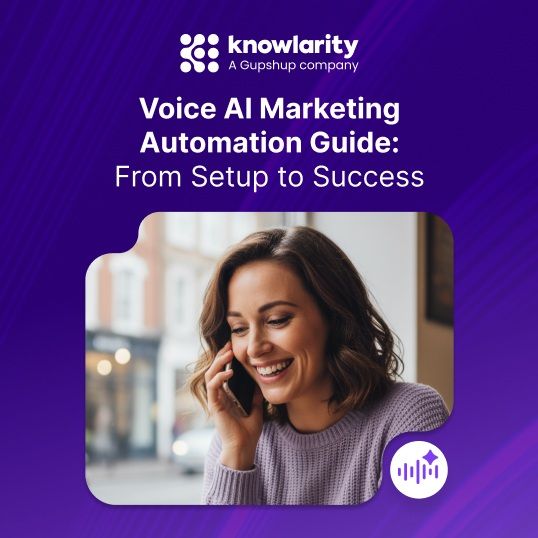Voice AI Marketing Automation Guide: From Setup to Success

Voice AI marketing automation reshapes how businesses connect with customers today. Smart devices have changed the game - over 50% of searches now happen through voice commands, and this number keeps climbing. The numbers tell an interesting story: more than 70% of smartphone users now rely on voice searches every day.
The digital world demands that businesses adapt quickly. AI marketing automation tools are no longer optional extras - they're the foundations of modern marketing. Local businesses feel this impact strongly, with 58% of consumers using voice search to find them. Online shopping has caught up too, as 24% of shoppers have tried voice commands at least once. This is a big deal as it means that the global voice assistant market will reach US$47 million by 2032.
Traditional marketing methods simply can't compete with what voice automation offers. Companies that use voice AI marketing see better answer rates and connect rates than SMS or email campaigns. They also convert customers faster and reduce missed appointments. On top of that, 90% of marketing professionals already use AI tools to handle customer interactions. The results speak for themselves - 88% say these tools help create personalized customer experiences across different channels.
This piece offers a detailed walkthrough of voice AI marketing automation. You'll learn about the technology basics, set up your first voice AI system, and master advanced strategies while avoiding common pitfalls.
Understanding Voice AI in Marketing
Voice technology's role in marketing has become crucial as businesses look for innovative ways to connect with consumers in our digital world.
What is Voice AI marketing automation?
Voice AI marketing automation blends artificial intelligence with speech technologies that help machines process, understand, and respond to human speech at scale. The technology combines text-to-speech, speech recognition, natural language understanding, and conversational AI to automate voice-based marketing interactions. Voice AI converts spoken words into text, analyzes the input, and generates appropriate responses.
The system follows a multi-step process. It captures spoken words through speech-to-text recognition and interprets intent through natural language understanding. A dialog manager handles conversation flow, which outputs natural-speaking replies. This detailed approach enables customized experiences at scale. Campaigns can populate greetings and offers with customer context to increase relevance.
How voice automation is different from traditional automation
Voice marketing automation stands apart from traditional marketing automation by bringing phone leads into the measurable marketing funnel. This integration creates true closed-loop reporting and gives marketers up-to-the-minute data analysis to optimize their investments.
Voice automation offers exceptional scalability compared to human resources. Traditional methods face limitations due to staff availability, while voice AI handles higher interaction volumes without extra personnel. Voice AI excels at delivering consistent brand experiences across customer touchpoints—a challenge with traditional methods that depend on human variability.
Key technologies powering Voice AI
Several advanced technologies work together to power Voice AI systems:
- Natural Language Processing (NLP): Allows AI to understand, interpret, and generate human-like responses, making digital assistants more conversational
- Automatic Speech Recognition (ASR): Converts spoken language into text format for processing
- Machine Learning Algorithms: Continuously improve system accuracy by learning from previous interactions
- Natural Language Understanding (NLU): Interprets meaning considering context, tone, and intent
- Text-to-Speech (TTS) Processing: Converts generated responses back into natural-sounding speech
Neural networks and deep learning enhance these technologies. They help voice assistants recognize speech patterns, handle complex language features, and deliver increasingly realistic responses.
Setting Up Voice AI for Marketing Automation
Your success with voice AI marketing automation depends on picking the right components and putting them together properly. Let's take a closer look at building a working voice AI system for your marketing efforts.
Choosing the right voice AI platform
The voice quality of your platform should sound natural and trustworthy. Your system needs to support multiple languages and accents when you serve markets of all types. A good platform understands context beyond keywords and responds intelligently to questions while keeping track of conversation history.
Integrating with CRM and marketing tools
Your voice AI should blend with your existing CRM system to pull customer data during calls and give relevant responses. This connection allows live data sharing, handles repetitive tasks automatically, and streamlines processes.
Look for platforms that support APIs and come with pre-built integrations with leading CCaaS providers to deploy faster. The system needs fallback options to text or SMS when voice communication hits snags, which keeps customer interaction flowing.
Creating voice-friendly content and scripts
Voice scripts are different from written content. Short, conversational sentences work best, with each one focusing on a single idea. A strong opening line grabs attention right away, and a clear call to action wraps things up.
Words that build trust, excitement, or curiosity help connect with your audience emotionally. See how easy it is to set up Voice AI for your marketing automation needs by booking a demo with us.
Training your AI for brand tone and context
Your voice AI should mirror your brand's personality through a complete brand voice guide. Start with your brand's identity, mission, vision, and values. Write detailed customer profiles that cover demographics, challenges, and communication priorities.
Set clear guidelines that go beyond simple descriptions like "friendly." Include examples of preferred terms, tone qualities, and messaging themes. Keep these voice training materials in a shared space or your company's knowledge base to maintain consistent AI-generated communications.
Voice AI Use Cases in Marketing
Companies at the cutting edge now use voice AI marketing automation at every customer touchpoint. This creates better connections and speeds up marketing processes.
Automated customer support and lead qualification
AI voice agents excel at qualifying leads through preset questions. They score answers live and connect promising prospects with sales teams. The numbers speak for themselves - companies that reach out to leads within five minutes see conversion rates jump up to 8X. Leading fintech brand's success story shows this works - their voice AI got 3X more users than their mobile app.
Voice commerce and product recommendations
Natural conversations make shopping hands-free with voice commerce. Research shows that 24% of shoppers have bought something using voice commands. The system knows your past purchases and priorities, which helps it suggest products that match your needs.
Voice-enabled ad campaigns and promotions
Brands connect with audiences differently now through interactive AI-enabled voice ads. These voice-activated ads get 7-10% response rates. This is a big deal as it means that traditional digital ads only get 1-3% clicks.
Appointment reminders and feedback collection
Voice AI helps businesses keep their schedules full by sending individual-specific confirmations and reminders. Healthcare providers cut missed appointments by 28% and earned $800,000 more in just seven months. The system also gathers feedback better - survey response rates jump from 14% to 48% compared to emails.
Abandoned cart recovery with voice outreach
Smart voice outreach brings back abandoned shopping carts. These interactive calls get 40-60% answers, way more than email opens. Tailored conversations address customer concerns directly and recover 20-35% of abandoned cart value.
Want to see these Voice AI marketing tools in action? Book a demo with us today.
Challenges and Best Practices
Businesses face unique challenges in voice AI marketing automation that need smart solutions to implement successfully.
Ensuring data privacy and compliance
Voice data handling requires strict privacy controls. Companies must follow GDPR, TCPA, and CCPA rules by setting up proper consent systems and secure storage practices. Voice recordings count as personal information, and users must give clear permission before collection and processing. SoC and ISO certification standards set the basic requirements to protect data properly.
Avoiding robotic or unnatural voice tones
Recent studies show 70% of consumers found machine-created content harder to trust online. Human oversight becomes crucial to keep AI-generated content accurate, culturally appropriate, and well-toned. Your brand's personality should shine through with specific tone guidelines that go beyond basic terms like "friendly".
Handling misinterpretations and fallback scenarios
Smart engineering of voice AI systems should mirror autonomous vehicles - they need preparation for failure, not just success. Your system needs backup plans ready when it fails to understand users. The biggest problem lies in most voice AI systems using single-threaded logic that fails completely when one part breaks down.
Testing and optimizing voice campaigns
Risk reduction comes through pilot testing, step-by-step rollout, and A/B testing of scripts and voices. Success depends on tracking which phrases cause hang-ups and fine-tuning your approach.
Conclusion
Voice AI marketing automation will revolutionize how businesses connect with customers by 2026. The numbers tell a compelling story. Voice searches now make up more than half of all searches. About 70% of people who own smartphones use voice search every day. This technology has become essential rather than just a cool feature.
Voice AI brings benefits that go way beyond just making things easier. Your return on investment improves through better answer rates, quicker conversions, and fewer missed appointments. The technology blends naturally with your existing CRM systems to create a smooth customer experience at every point of contact.
Making voice AI work takes smart planning. You need platforms that sound natural when they talk. Your content must work well with voice, and you should have backup plans ready. Customer trust depends on handling data privacy the right way. This means getting proper consent and keeping data safe.
Companies that adopt voice AI now lead the way in customer engagement. As the technology gets better, it offers smarter ways to qualify leads, handle voice shopping, and create customized outreach. Want to see how Voice AI can revolutionize your marketing? Book a demo with us today.
Marketing automation's future speaks like a human. Your customers want to listen. The question is: are you ready to talk back?
Written By: Nikunj Gupta

